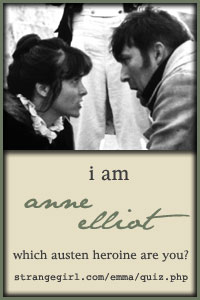 |
| Image Credit: Goodreads |
Question
 |
| The Classics Club |
Why? (for either answer)?
Favorite and/or least favorite Austen novel?


Response
I do like Jane Austen. I have no desire to, "dig her up and beat her over the skull with her own shin-bone," per Twain's instructions. My first exposure to Austen was not that long ago. I am ashamed to say that I had somehow reached adulthood without ever reading Austen, so when I signed up to take an English literature graduate class in my pursuit of a Masters in English, our paths finally crossed. One of the required readings was Persuasion. I was surprised at how much I enjoyed the novel. I recently read Sense and Sensibility on my own. Of the two, I preferred Persuasion. On my Classics Challenge page, I have listed the entire portfolio of Austen's work. One of the reasons I enjoy Austen is that she creates strong female protagonists who use the rigid system in which they must live and maneuver to enhance their standing in the world. I am not obsessed with Jane Austen, as some are, but I pursue the exposure to her body of work to enhance my growth as a reader. Jane Austen was a writer who chronicled the world of her time. A world where women did not possess the same freedoms that we do today. You most definitely need to see Austen's novels through the "rose colored glasses" of her time or you might want to, "dig her up and beat her over the skull with her own shin-bone." The events in her novels are particular to a world that is no-longer, and that is probably why some find Austen hard to swallow. Relating to this foreign world is the problem. The history of the time is important to allowing one to appreciate Austen.



Quotes
“The person, be it gentleman or lady, who has not pleasure in a good novel, must be intolerably stupid.” ― Jane Austen
“I do not want people to be very agreeable, as it saves me the trouble of liking them a great deal.”
― Jane Austen, Jane Austen's Letters
― Jane Austen, Jane Austen's Letters
“The more I know of the world, the more I am convinced that I shall never see a man whom I can really love. I require so much!” ― Jane Austen, Sense And Sensibility


Biography From Goodreads.com
Jane Austen
Born
December 16, 1775 in Hampshire, The United Kingdom
Died
July 18, 1817
Genre
About this author
:
Jane Austen (16 December 1775 – 18 July 1817) was an English novelist whose works of romantic fiction, set among the landed gentry, earned her a place as one of the most widely read writers in English literature, her realism and biting social commentary cementing her historical importance among scholars and critics.

 |
| Harvard University Press |


Don't forget to check out our Classics Challenge Page, which lists all the classics we plan to read between September 14, 2012 and September 14, 2017. Also, visit The Classics Club. For more information on "What Makes Jane Austen So Great" Click Here!

Take the Jane Austen Character Quiz here!
Happy Reading!
Things You Can Read
Believe In Truth, Beauty, Freedom, Love, and the Power of Books!


I absolutely think that, despite my unequivocal love for Twain, he got this wrong. He misread Austen, possibly because he never really gave her a chance - did he finish any of her books, or just start and abandon them (his own words in a letter to his friend would seem to point to the latter). Could he possibly have understood the world she was talking about? And how open were male readers to strongly opinionated female writers?
ReplyDeleteThere's a lot to question about his analysis and vitriolic hatred of Austen's works. But, at the bottom of it all, I think he just didn't "get" her world. I think he mistook her books for simple pastoral praises of her time and place in society - as you say, a rose colored world of wealthy, lovely people who sit around all day gossiping and going to balls at night. But Austen really examines this world and the people in it - critically, and they are not always held in the highest regard by her.
She's extremely subtle, whereas Twain was incredibly bombastic. The funny thing is, despite their distinct delivery methods and very different personalities, I think they were actually quite similar.
Yes! I think that Twain failed to realise that Austen's dialogue was just as rooted in the world of her characters as his dialogue was. And her subtle set-ups actually require repeated readings to really appreciate how remarkable they are.
DeleteI love Twain too, but they're very different worlds, different times and very different personalities. Perhaps Twain and Miss Bingley would have got on well together??